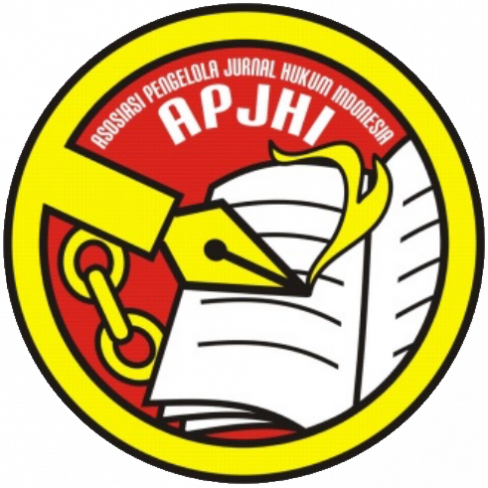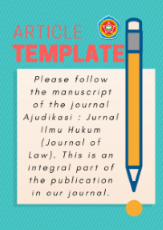Penerapan Undang-Undang Kepailitan dalam Menciptakan Iklim Berusaha Yang Sehat Bagi Seluruh Pelaku Usaha
DOI:
https://doi.org/10.30656/ajudikasi.v2i1.599Abstract
Law Number 37 Year 2004 concerning Bankruptcy and Postponement of Debt Payment Obligation (PKPU) is enacted in good faith to protect the rights of creditors who have receivables on the insolvent party, since in general the assets left by the insolvent party is less than the amount of the debt . So that the condition is very potential to cause chaos if the number of creditors more than one, because they each will fight each other to control the assets left behind as compensation for the settlement of receivables, and eventually among the creditors will apply: "who fast/strong he can, and who is slow / weak he bit the finger". With the stipulation of bankruptcy provisions in this law, congruent lenders will no longer fight each other because each will get the compensation of debt repayment proportionally according to the principle of "pari pasu pro rata parte".Downloads
References
Asikin, Zainal. Hukum Kepailitan Dan Penundaan Kewajiban Pembayaran Utang Di Indonesia, Pustaka Reka Cipta, Bandung, 2013.
Dirdjosisworo, Soedjono. Bertrand Russell, Cita-Cita Politik, Armico, Bandung, 1983.
Harahap, M. Yahya. Beberapa Tinjauan Mengenai Sistim Peradilan dan Penyelesaian Sengketa, Cet. 1. Citra Aditya Bakti, Jakarta, 1997.
Hoff, Jerry. Undang-Undang Kepailitan Di Indonesia, Penterjernah Kartini MuIjadi, PT. Tatanusa, Jakarta, 2000.
Indonesia, Undang-Undang Advokat, Undang-Undang No. 18 Tahun 2003 tentang Advokat Lembaran Negara Republik Indonesia Tahun 2003 Nomor 49, Tambahan Lembaran Negara Republik Indonesia Nomor 4288.
Kansil, C.S.T dan Cristine S.T, Hukum Perusahaan Indonesia Bag 1, Pradnya Paramita, Jakarta, 2005.
Kitab Undang-Undang Hukum Perdata (Burgerlijk Wetboek Voor Indonesie), Staatsblad Tahun 1847 Nomor 23.
Kusumah, Mulyana W. Perspektif, Teori dan Kebijaksanaan Hukum, Rajawali, Jakarta, 1986.
Rasjidi, Lili. dan Putra. I. B. Wiyasa, Hukum Sebagai Suatu Sistem, Remaja Rosdakarya, Bandung, 2005.
Reinhard, Anton. Masalah Hukum (dari Katalog Sampai Kwitansi), Cet. 1, Aksara Persada, Jakarta, 1985.
Sastrawidjaja, H. Man S. Hukum Kapailitan Dan Pendundaan Kewajiban Pembayaran Utang, PT. Alumni, Bandung, 2006.
Shubhan, M. Hadi. Hukum Kepailitan, Prinsip, Norma dan Praktik Di Pengadilan, Prenadamedia, Jakarta, 2008.
Sinaga, Syamsudin. Hukum Kepailitan Indonesia, Tianusa, Jakarta, 2012.
Sjahdeini, Sutan Remy. Hukum Kepailitan, Memahami Faillissemensverordening Juncto Undang-undang No. 4 Tahun 1998, PT. Pustaka Utama Grafiti, Jakarta, 1998.
Soemitro, Rony Hanitijo. Beberapa Masalah Dalam Studi Hukum Dan Masyarakat, Remadja Karya, Bandung, 1985.
Subekti, R. R. Tjitrosudibio, Kitab Undang-Undang Hukum Perdata, PT. Pradnya Paramita, Jakarta, 2005.
Suparman, Eman. “Persepsi Tentang Keadilan Dan Budaya Hukum Dalam Penyelesaian Sengketaâ€, Makalah Pada Seminar Nasional Tentang Pendayagunaan Sosiologi Hukum Dalam Masa Pembangunan Dan Restrukturisasi Global, Fakultas Hukum UNDIP, Semarang, 12-13 Nopember 1996.
Supramono, Gatot. Bagaimana Mendampingi Seseorang di Pengadilan: Dalam Perkara Pidana dan Perkara Perdata, Djambatan, Jakarta, 2008.
Suyudi, Aria. Eryanto Nugroho, Herni Sri Nurbayanti, Kepailitan di Negara Pailit, Pusat Studi Hukum & Kebijakan Indonesia, Jakarta, 2003.
Widjaya, Gunawan. “Risiko Hukum & Bisnis Perusahaan Pailitâ€, Majalah Forum Sahabat, 2000.
“Apa Itu Kepastian Hukumâ€, http://yancearizona.wordpress.com, diakses tanggal 10 September 2017.
“Empat Kiat Jadi Advokat Kepailitan Yang Handal, Jika Tak Mau Dicurangi, Jangan Curangi Orang Lainâ€, http://www.hukumonline. com/berita/ baca/lt5582549f59b6e/ empat- kiat- jadi- advokat-kepailitan- yang- handal, diakses tanggal 10 September 2017.
Downloads
Published
Issue
Section
License
Authors who publish with this journal agree to the following terms:
Authors retain copyright and grant the journal right of first publication with the work simultaneously licensed under a Creative Commons Attribution License that allows others to share the work with an acknowledgment of the work's authorship and initial publication in this journal.
Authors can enter into separate, additional contractual arrangements for the non-exclusive distribution of the journal's published version of the work (e.g., post it to an institutional repository or publish it in a book) with an acknowledgment of its initial publication in this journal.
Authors are permitted and encouraged to post their work online (e.g., in institutional repositories or on their website) before and during the submission process, as it can lead to productive exchanges and earlier and greater citation of published work.
All articles in Ajudikasi : Jurnal Ilmu Hukum can be disseminated provided they include the identity of the article and the source of the article (Ajudikasi : Jurnal Ilmu Hukum). The publisher is not responsible for the contents of the article. The content of the article is the sole responsibility of the author
Ajudikasi : Jurnal Ilmu Hukum is lincensed under a Creative Commons Attribution-ShareAlike 4.0 International License.










1.png)
.png)
.png)





.png)
.png)
.png)
.png)





.png)







